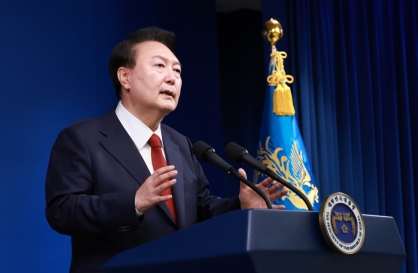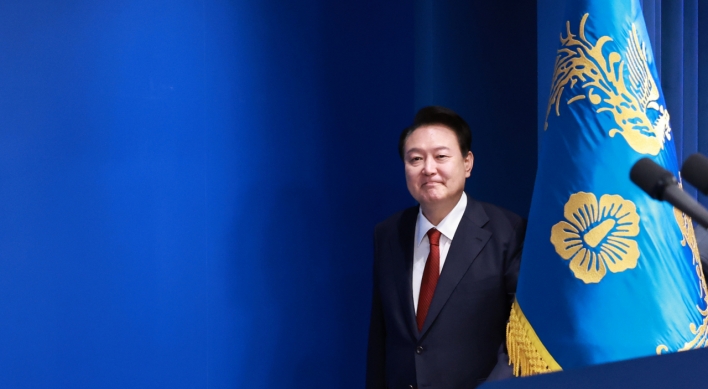Building a canal by connecting the country’s four major rivers was one of the top pledges of former President Lee Myung-bak’s presidential campaign in 2007.
In the face of popular opposition, the project was scaled down to refurbishing the Hangang, Nakdonggang, Yeongsangang and Geumgang rivers to clean them up, increase water supply and prevent floods.
The project, however, continued to face strong resistance from the opposition and civic environmental groups for its alleged negative effects on the environment, such as worsening the water quality and leading to the deaths of fish and other animals in the rivers.
In the face of popular opposition, the project was scaled down to refurbishing the Hangang, Nakdonggang, Yeongsangang and Geumgang rivers to clean them up, increase water supply and prevent floods.
The project, however, continued to face strong resistance from the opposition and civic environmental groups for its alleged negative effects on the environment, such as worsening the water quality and leading to the deaths of fish and other animals in the rivers.

Now as the controversy spills over to Lee’s conservative successor, the new Park Geun-hye administration is seen trying to sidestep a barrage of attacks by hinting at a full-scale overhaul of the project.
Two ministers-designate of environment and land, in their confirmation hearings last week, expressed their concerns and willingness to “restore the damage.“
“The rivers now look like closed systems of lakes and marshes, so it is not easy to improve the water quality,” said Environment Minister-nominee Yoon Seong-kyu at a hearing on Feb. 27.
The statement ran counter to those of the Lee government, supporters and participants in the project, most of whom claimed there was no problem.
Yoon also noted that a destruction of the weirs, which are blamed for slowing down the river flow and deteriorating the water quality, could be an option “if a majority of the public agrees” with it.
Suh Seung-hwan, minister-nominee for land and transportation, also said at a hearing on Feb. 28, “(I) will make up for the shortcomings of the project as necessary after looking into it.”
A full-fledged reevaluation of Lee’s pet project appears inevitable, particularly after the National Assembly passed a bill on Feb. 26 to investigate the efficacy of the four-river restoration work.
The four-river project left a scar in the final month of the Lee administration, following a January report by the Board of Audit and Inspection that found faults in the project including substandard construction and poor inspection and management of river water quality.
The report, which showed a stark contrast to its earlier stance that generally supported the project, was both welcomed and criticized for what observers called the “political timing” of its release.
The members of Lee’s administration rebuked the report, saying the project must be evaluated from a multidimensional, long-term point of view.
Lee was also seen trying to defend his flagship project by saying at his retirement speech, “It is necessary to continue our efforts to carry on the purpose of the four major rivers’ restoration project which was launched to deal with water shortages as well as large-scale floods and drought caused by climate change.”
A recent poll showed, however, that 34 percent of the public viewed the four-river project as the worst initiative enacted by the former president.
Environmental activists are now ratcheting up their move against the project.
“We (civic groups) basically welcome the statements of the minister nominees and the parliament’s passage of the bill. The Park Geun-hye government should form a committee with experts and civic groups, strictly investigate the fault-riddled project, and come up with measures to secure safe and clean water for the people,” said Park Chang-jae, a director from the Korean Federation of Environmental Movement, a civic group.
“The rest (whether those who forcefully and wrongfully proceeded with the plan should be punished) will be up to the people and history.”
Evaluations of the project conducted from 2008 to 2012 had been sharply split, exposing a slew of controversies along the way. They ranged from heated debates over its efficacy in preventing flooding, improving water quality and creating quality jobs, to allegations of damage to cultural assets, safety accidents, excessive budget spending, and government pressure against negative news coverage of the project.
Environmental groups mainly contend that the project’s damage to the rivers and ecosystems will affect generations to come, with their restoration coming at huge cost to the nation.
For instance, while construction along the rivers was under way, green algae had covered the Han and Nakdong rivers, allegedly due to the 16 newly built weirs, leading people to refer to the river as a “green latte.”
Toxic algal blooms also found in the rivers stoked concerns over the safety of the drinking water.
The latest BAI report said that the weirs cause longer water stagnation time from 8.6 days to 100 days, resulting in 1.3 to 2.3 times more algae.
The report also found faults with the methods of measuring the water quality. The Chemical Oxygen Demand test, which measures all chemicals in the water that can be oxidized, should have been used instead of the Biochemical Oxygen Demand test, which measures the amount of oxygen consumed by
microbial oxidation, the report suggested.
“Due to faulty designs, 11 of the 16 dams lack durability, water quality is feared to deteriorate, and inefficient dredging will lead to excessive maintenance costs,” it said.
With maintenance bills estimated to top 288 billion won ($266 million) annually, the state auditor urged the government to fix urgent defects in the weirs and craft comprehensive guidelines to improve water quality and manage dredging operations and riverside areas.
Created by the Lee government to create 340,000 jobs, the critics also claimed the project had little economic benefit for the nation.
Former Democratic United Party lawmaker Choi Young-hee said in 2011 that the number of workers involved in the project under employment insurance only reached 4,164.
The project, which cost 22.2 trillion won, meanwhile, was associated with more than a dozen deaths, including workers, soldiers during a military drill, and a monk who burned himself in protest against the river project.
The Lee administration, on the other hand, had refuted the BAI report.
“Most of the weirs, except for three, which are suspected of their durability have been reinforced, and work on the remaining ones will soon be completed,” Kwon Do-yup, the minister of land and transportation, said at a news briefing the day after the BAI report was released.
“Since the inspection by the BAI was conducted from May to September 2012, such fixes were not reflected on the report,” Kwon said.
Officials from the Ministry of Environment also said that the ministry, which had mainly utilized the BOD for checking the water quality of streams and rivers, would apply additional measures including COD to monitoring the water quality.
By Kim Young-won (wone0102@heraldcorp.com)
-
Articles by Korea Herald









![[K-pop’s dilemma] Time, profit pressures work against originality](http://res.heraldm.com/phpwas/restmb_idxmake.php?idx=644&simg=/content/image/2024/05/08/20240508050705_0.jpg&u=20240508171126)

![[K-pop's dilemma] Is Hybe-Ador conflict a case of growing pains?](http://res.heraldm.com/phpwas/restmb_idxmake.php?idx=644&simg=/content/image/2024/05/07/20240507050746_0.jpg&u=)







![[Today’s K-pop] Stray Kids to drop new album in July: report](http://res.heraldm.com/phpwas/restmb_idxmake.php?idx=642&simg=/content/image/2024/05/09/20240509050659_0.jpg&u=)